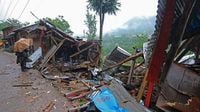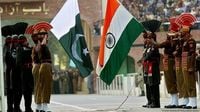As tensions escalate between India and Pakistan, the two nuclear-armed nations are facing their most severe confrontation in decades. Following a series of attacks and retaliatory strikes, more than 50 people have reportedly been killed, raising alarms about a potential full-scale war.
On April 22, 2025, a brutal attack by terrorists in the Kashmiri town of Pahalgam claimed the lives of 26 Indian civilians, predominantly Hindu tourists. India promptly attributed the attack to Pakistan-backed militants, intensifying the already fraught relationship between the two countries. Just weeks later, on May 7, India launched air strikes against what it described as terrorist camps in Pakistani territory, a move that has been met with fierce retaliation.
Pakistan's military has responded vigorously, claiming to have downed several Indian fighter jets and drones. Pakistani officials have reported that up to 50 Indian soldiers were killed in the latest exchanges of fire along the heavily militarized Line of Control (LoC), although India has yet to confirm these losses. In the chaos, five civilians, including a two-year-old girl, were killed in Indian shelling in Pakistan-administered Kashmir, further inflaming tensions.
As the conflict escalates, the Indian government has closed 24 airports across the country, with reports suggesting that civilian flights may resume shortly. The Indian Premier League cricket tournament has also been suspended for a week, while Pakistan's Super League has been moved to the United Arab Emirates amid the violence.
Military analysts are closely monitoring the situation, noting that both countries have amassed significant forces along the border. India boasts approximately 1.5 million active soldiers and a defense budget of around $86 billion, making it the fourth-largest military in the world. In contrast, Pakistan has about 650,000 active soldiers and a defense budget of $10.2 billion, ranking it twelfth globally.
The ongoing conflict is not new; India and Pakistan have fought several wars since gaining independence from British rule in 1947, primarily over the disputed region of Kashmir. The situation was further complicated in 2019 when the Indian government revoked the limited autonomy of the region, leading to increased violence and military operations.
In the wake of the recent attacks, Pakistani officials have condemned India's actions as reckless, warning that such conduct could lead to a major conflict. Pakistan's Foreign Minister Shafqat Ali Khan stated, "India's jingoism and war hysteria should be a source of serious concern for the world," reflecting the heightened rhetoric from both sides.
Despite the rising death toll and escalating military actions, the international community has called for restraint. American Vice President JD Vance emphasized the need for de-escalation, while Iranian Foreign Minister Abbas Araghchi met with Indian officials in an attempt to mediate the situation.
As the conflict continues, ordinary civilians on both sides are bearing the brunt of the violence. Reports indicate that schools have closed, affecting millions of children, and residents are living in fear of further escalation. One Pakistani resident lamented, "Our life is worth nothing. At any time, entire families could be wiped out," highlighting the human cost of this ongoing conflict.
Both governments remain entrenched in their positions, with India insisting on a strong military response to perceived threats and Pakistan denying any involvement in the recent attacks. This cycle of violence and retaliation has left many questioning whether military action is truly effective in deterring terrorism or merely exacerbating the situation.
Data from the South Asia Terrorism Portal shows a complex picture regarding fatalities from terrorism in Jammu and Kashmir. While the numbers have fluctuated over the years, the Modi government's policy of retaliation has not significantly reduced the number of attacks. Proponents of this tough stance argue it is necessary to apply pressure on Pakistan to cease its support for militant groups, yet the effectiveness of such a strategy remains debatable.
As the world watches closely, the question remains: will these military actions lead to a resolution, or are both nations on a path toward a more devastating conflict? The stakes have never been higher, with the potential for nuclear escalation looming large over the subcontinent.





